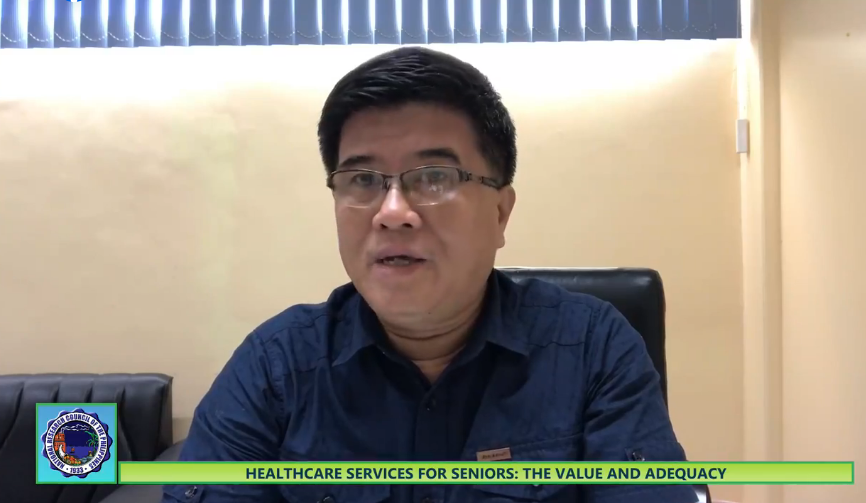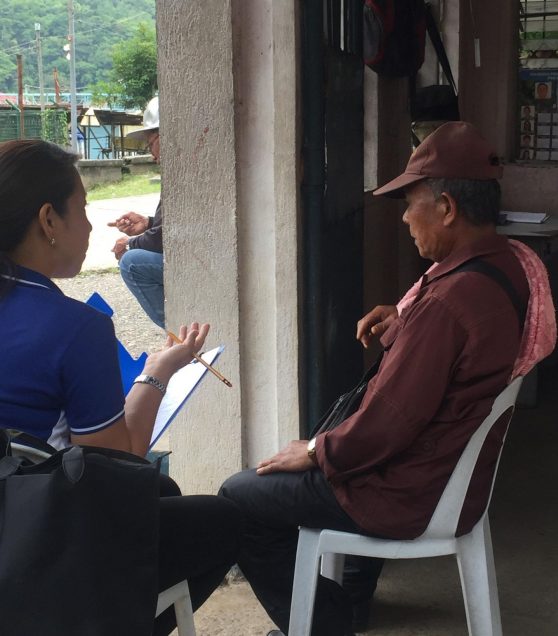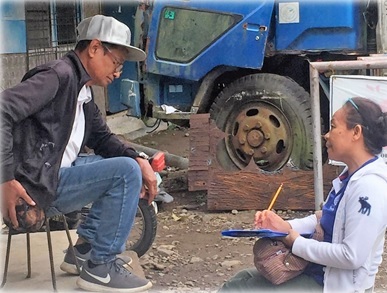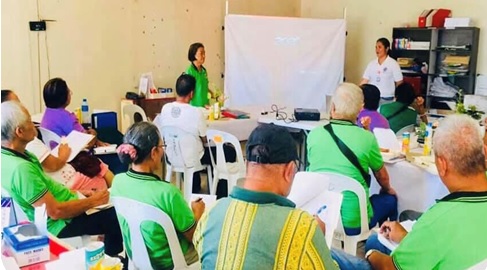
Not enough miscellaneous health services for seniors, says SU study
Miscellaneous healthcare services, which include medical assistance during disasters and after-hospital care, garnered low sufficiency ratings among senior citizens based on a study led by Dr. Enrique G. Oracion, Silliman University (SU) Research and Development director.
The study, titled “Are Older Persons Satisfied? Assessing the Quality and Sufficiency of Local Healthcare Delivery,” assessed the perceived quality and sufficiency of local healthcare services received by senior citizens, with 229 senior citizens living in the Metro Dumaguete Area as respondents.

Oracion presents the study’s findings during the first virtual NRCP Visayas Regional Policy Forum, December 2, 2020.
A regular member of National Research Council of the Philippines (NRCP) Division of Social Sciences, Oracion presented the results of the study in the first virtual NRCP Visayas Regional Policy Forum last December 2, 2020.
In the study, respondents were asked to rate the sufficiency of miscellaneous healthcare services, which were identified as the following based on the Expanded Senior Citizens Act of 2010 (RA 9994): Neighborhood support services which provide caregiving services; Medical assistance during disasters; Substitute family care or group homes for neglected older persons; Monthly stipend for medicine; and Aftercare and follow-up services after hospital discharge.
Almost all of the said categories under miscellaneous health services were rated “very insufficient” and “insufficient,” except the neighborhood support services which received an average rating of “sufficient.”
The study categorized miscellaneous healthcare services as part of the benefits and privileges for the elderly.
Respondents generally found healthcare benefits and privileges to be “very sufficient,” however Oracion said providing miscellaneous services and discounted professional fees for home health services can still be improved as these two categories were rated as “insufficient” and “enough,” respectively.


A team composed of instructors from Silliman University (SU) College of Nursing conduct field interviews with senior citizens in the Metro Dumaguete Area last April 2019, to gather data for the research project led by Dr. Enrique G. Oracion, SU research director, titled “Are Older Persons Satisfied? Assessing the Quality and Sufficiency of Local Healthcare Delivery.” The study was funded by the DOST-National Research Council of the Philippines.
“Both national and local governments should take a keen look at how to better provide for miscellaneous health services to all older persons,” said Oracion.
Public and private healthcare
The study also asked respondents to rate the quality of public and private healthcare providers and institutions, and the sufficiency of health personnel. Both received high ratings.
“(Respondents) reported getting the right treatment, the right diagnosis, and easy-to-understand answers from their health professionals. But it was observed among all parameters that the lowest rating was in ‘getting immediate attention’ from attending health professionals,” said Oracion.
Public healthcare personnel received comparatively lower marks in “receiving the right diagnosis” and “getting immediate attention,” which Oracion said furthers the idea that private healthcare institutions provide better service but at a higher price.
“Overall, private institutions (were) rated relatively higher than their public counterparts, though both still achieve the ‘very good’ quality rating,” added Oracion.
Even with the high ratings, Oracion said interventions can still be implemented to make healthcare services available for all, particularly in providing the right diagnosis and giving prompt medical attention.
Moderate satisfaction
The study found that, while the elderly are “highly satisfied” with the quality and sufficiency of the healthcare services they received, they are only moderately satisfied with the benefits and privileges.
The study also found that the elderly perceive services as “sufficient” when they are satisfied with the quality, and that their appreciation of the quality and sufficiency of healthcare increased when they utilized the services more.
Guide for policymaking
As the first NRCP-funded research on the elderly population in a local scope, the study aims to inform the public and provide recommendations for future research, policymaking, and program interventions.

During the forum, DOST Secretary Fortunato T. de la Peña said the annual policy forum of the NRCP aims to help policymakers craft laws and policies and enhance existing laws and policies using research findings and evidence.
“I hope after this forum, policy recommendations from Dr. Oracion will be validated to help policymakers address the health needs of our elderly, improve the coverage and quality of services they have been receiving, and help them access these services at an affordable cost,” said de la Peña.
The NRCP, under the DOST, acts as an advisory body to the government on issues of national interest.
Aside from Oracion as the project leader for the study, the research team was composed of instructors from the SU College of Nursing: Dr. Theorose Q. Bustillo and Chereisle G. Pyponco as project staff; Rochie C. Cagara, Kathleah S. Caluscusan, Noyme Lour L. Laviste, and Ida Olga R. Vidal as field interviewers.


